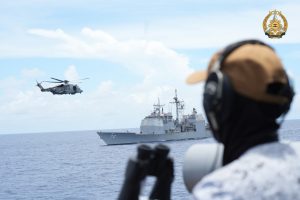The United States, Australia, Canada and the Philippines held air and naval maneuvers Wednesday in a show of force that they said aimed to promote the rule of law in the disputed South China Sea, where China has increasingly asserted its territorial claims.
In an apparent response, China said it conducted air and sea combat patrols on the same day. The Philippine military said three Chinese navy ships “tailed” the four-nation maneuvers off the western coast of the Philippines, but did not provide more details.
Admiral Samuel Paparo, who heads the U.S. Indo-Pacific Command, and top military and defense commanders from Australia, Canada, and the Philippines said in a joint statement that they “stand together to address common maritime challenges and underscore our shared dedication to upholding international law and the rules-based order.” They said they were staging the two-day exercises to uphold unhindered passage in the Indo-Pacific region.
China has long claimed much of the South China Sea, a key global trade and security route, and vowed to defend its territorial interests at all costs. Its claims overlap those of smaller coastal states, including the Philippines and Vietnam, hampering their access to traditional fishing areas and disrupting oil and gas exploration in their internationally recognized exclusive economic zones.
“The naval and air force units of participating nations will operate together, enhancing cooperation and interoperability between our armed forces,” the commanders said. “The activity will be conducted in a manner that is consistent with international law and with due regard to the safety of navigation and the rights and interests of other states.”
The Philippine military said Wednesday’s drills included combined sea passage maneuvers and communications drills with assault helicopters flying low over the navy ships in the high seas. An anti-submarine warfare drill was also planned, it said.
A Philippine navy spokesperson, Rear Admiral Roy Trinidad, said the exercises were not directed at any country but were “a collective expression of support for a rules-based international order.”
China said it held joint sea and air combat patrols on Wednesday near Scarborough Shoal, a disputed territory in the South China Sea, in an apparent response to the exercises. The Philippine military said it did not monitor any Chinese combat patrols at the shoal.
A short statement from the Chinese military’s Southern Theater Command indicated that it was aware of “military activities that disrupt the South China Sea” and that they were “under control.” China regularly accuses the U.S., the Philippines and others of undermining regional peace and stability though their military activities.
Paparo and the other military commanders, Admiral David Johnston of the Australian Defense Force, General Jennie Carignan of the Canadian Armed Forces and General Romeo Brawner Jr. of the Armed Forces of the Philippines, said their countries “uphold the right to freedom of navigation and overflight, other lawful uses of the sea and international airspace, as well as respect for maritime rights under international law.”
They did not mention China by name but said their nations affirm a 2016 arbitration ruling on the South China Sea disputes “as a final and legally binding decision on the parties to the dispute.” The ruling invalidated China’s expansive claims in the South China Sea, but Beijing refused to participate in the Philippines-initiated arbitration, rejected the decision, and continues to defy it.
Hostilities in the disputed waters have flared particularly between Chinese and Philippine coast guard and naval forces at two disputed shoals since last year, renewing fears that the confrontations could degenerate into a larger armed conflict involving the United States, Manila’s longtime treaty ally.
After an alarmingly violent June 17 confrontation at Philippine-occupied Second Thomas Shoal in the South China Sea, China and the Philippines reached a temporary agreement last month aimed at preventing further clashes.

































